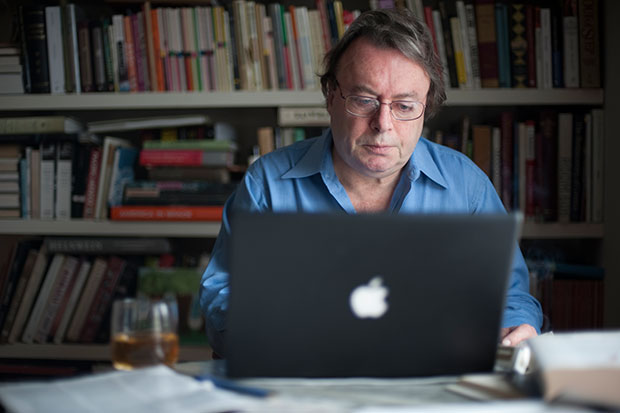Four years after his death, it is still faintly surprising to recall that Christopher Hitchens is no longer resident on this Earth — or on any other sphere, if his friend Richard Dawkins is correct. A quote from Dawkins graces the cover of And Yet…, a final gathering together of Hitchens’s essays and the sequel to the bestselling anthology Arguably; he was, notes his ‘fellow horseman’, the ‘finest orator of our time’. And here is that voice again, alive, fiercely engaged with many of the same issues he left us to deal with: politics, patriotism, God or His absence, death and, inevitably, books.
There was much about Hitchens that was contradictory and he knew it and embraced it in his work. As the titles of both Arguably and And Yet… suggest, Hitchens was a polemicist who was willing to concede another point of view. He frequently used the essay form to state his position on an issue, circle around it and look at the problem from another angle, before returning to counter the counter-argument and restate his case. And Yet… ends with a single-paragraph essay from 1991 which asks and seeks to answer the question ‘What is patriotism?’ Having executed a whistlestop tour of the options, Hitch concludes with the phrase: ‘Internationalism is the highest form of patriotism.’ And you believe him.
What he was supremely good at was communicating his enjoyment of this process of point and counterpoint via his prose, which is one of the reasons he is so entertaining to read. Take this example from a piece published posthumously in Vanity Fair in 2012 entitled ‘Charles Dickens’s Inner Child’, in which Hitchens interrogates Dickens’s irrepressible love of a birthday party:
This is big-hearted, and we might all do a bit more of it. It would help me to forgive, perhaps just a little, the man who helped generate the Hallmark birthday industry and who, with some of his less imposing and more moistly sentimental prose scenes in A Christmas Carol, took the Greatest Birthday Ever Told and helped make it into the near Ramadan of protracted obligatory celebration now darkening our Decembers.
You can feel Hitchens accelerating gleefully towards that final ‘near Ramadan’ and what follows. It’s not just terrific prose; it’s someone delighting in his facility for writing stuff this good.
Of course Hitchens was also a reviewer as much as an essayist, and above all, he was a reader. And Yet… covers, variously, Dickens, Lermontov, Orhan Pamuk, Salman Rushdie, Ian Fleming, Clive James, Edmund Wilson, Joan Didion, G.K. Chesterton and, needless to say, Orwell (twice). Again, his strength was his enthusiasm for the idea that the writer or book in question sparked in him, the sense that it had both grabbed him and vice versa. The review here called ‘V.S. Naipaul: Cruel and Unusual’, ostensibly dealing with The World Is What It Is, Patrick French’s startlingly unfettered biography of Naipaul, serves as a rueful meditation on the gap between the humanity in an artist’s work and the seeming callousness of their private life. Its tone is almost one of regret: ‘Brahman fastidiousness, his defenders used to murmur. I am not so sure that this alibi will work any longer’.
As an essayist, Hitchens was inimitable — as he says of Dickens, ‘That [he] should have had the nerve to call himself, simply, “the Inimitable” may seem conceited. All right then, so it was.’ Reading the essays in And Yet…, one wishes Hitchens were still here to be similarly conceited about himself; he earned it.
In contrast, the novelist Shirley Hazzard, a selection of whose reviews and essays have been published as We Need Silence to Find Out What We Think, would never do anything so flashy as draw attention to herself in this manner. In the excellent introduction to this volume, the book’s editor Brigitta Olubas defines Hazzard, who has retired from public life, as the epitome of a ‘New York intellectual’, quoting David Daiches on Lionel Trilling: ‘Intelligent, curious, humane, well-read, interested in ideas, fascinated by other places, immensely knowledgeable about European culture.’
Hazzard is a novelist, critic and essayist; she also, famously, worked for the United Nations for many years, occasionally holding it to account in print. Indeed, she broke the story of Secretary-General Kurt Waldheim’s wartime involvement in the Austrian Nazi party. ‘There is no such thing as official cowardice,’ she wrote in 1974 in the New York Times. ‘All cowardice — like all true courage — is personal.’
In addition to her sporadic political writings, Hazzard’s careful, sensitive reviews of novels by Muriel Spark, Jean Rhys, Patrick White and Barbara Pym are included here, as are musings on Proust and William Maxwell. However, it is the title piece and the extended essay ‘The Lonely Word’, articulating the author’s lifelong commitment to literature, its demands on both writer and reader and also its rewards, which are the highlights of an elegant and cultured collection.






Comments